

Netflix Prize. The Netflix Prize was an open competition for the best collaborative filtering algorithm to predict user ratings for films, based on previous ratings without any other information about the users or films, i.e. without the users or the films being identified except by numbers assigned for the contest.
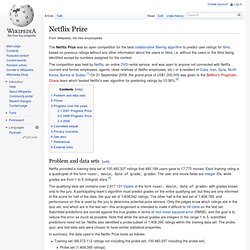
The competition was held by Netflix, an online DVD-rental service, and was open to anyone not connected with Netflix (current and former employees, agents, close relatives of Netflix employees, etc.) or a resident of Cuba, Iran, Syria, North Korea, Burma or Sudan.[1] On 21 September 2009, the grand prize of US$1,000,000 was given to the BellKor's Pragmatic Chaos team which bested Netflix's own algorithm for predicting ratings by 10.06%.[2] Problem and data sets[edit] GrandPrize2009_BPC_BellKor. Why Netflix Never Implemented The Algorithm That Won The Netflix $1 Million Challenge. You probably recall all the excitement that went around when a group finally won the big Netflix $1 million prize in 2009, improving Netflix's recommendation algorithm by 10%.
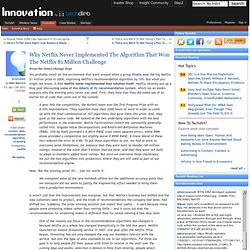
But what you might not know, is that Netflix never implemented that solution itself. Netflix recently put up a blog post discussing some of the details of its recommendation system, which (as an aside) explains why the winning entry never was used. First, they note that they did make use of an earlier bit of code that came out of the contest: A year into the competition, the Korbell team won the first Progress Prize with an 8.43% improvement. They reported more than 2000 hours of work in order to come up with the final combination of 107 algorithms that gave them this prize.
Neat. We evaluated some of the new methods offline but the additional accuracy gains that we measured did not seem to justify the engineering effort needed to bring them into a production environment. Remember Netflix’s $1m algorithm contest? Well, here’s why it didn’t use the winning entry. Netflix was founded in the US in 1997, starting initially as a DVD-rental delivery service before finally morphing into more of a VoD streaming service.
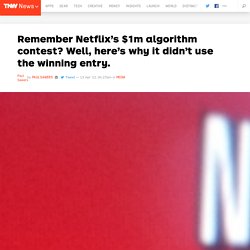
Today, it serves the US and Canada, Latin America, the Caribbean, and, as of January this year, the UK and Ireland, where it finally arrived to exchange blows with LoveFilm. Cast your mind back to when the company launched the Netflix Prize. BellKor's Pragmatic Chaos. Old News:September 10: There are rumors popping up that Netflix will be announcing the official winner of the Netflix Prize in a ceremony in New York City on September 21.
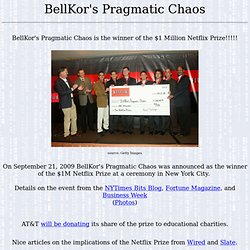
September 8: Check out our colleague Yifan Hu's cool interactive maps on the Netflix movie database. September 4: Bob Bell featured in a kinda weird article, originally in the Washington Post: "Movie tips from your robot overlords " August 5: Bob Bell was interviewed for the NPR show "On The Media": Getting to Know You August 5: Team BellKor's article on matrix factorization methods in in the new edition of IEEE Computer: Matrix Factorization Techniques for Recommender systems. The Human Touch Beats Computer Algorithm Suggestions - Kevin Stapleford - Voices.
Almost 30 years ago, Electronic Arts famously ran an advertisement that asked, “Can a Computer Make You Cry?”

It was a thought-provoking ad, but as far as I’m concerned, the answer is no. Computers can’t elicit the same type of emotional responses that another living, breathing person can, but they might get you partway there. In the center of the latest “computers versus humans” debate is the use of algorithms for recommendation engines — especially among Web-based businesses, products and services that we use every day. Algorithms help us do everything from choosing our next read to finding a new job, but they often fall short; they just can’t replace pure peer-to-peer recommendations, emotional connections or personal experience.
As more and more businesses are discovering, the beauty is in the balance of using an algorithm to collect, collate, even filter (somewhat) and then add in that secret ingredient — the human touch — to create a recipe for success. You + Me = Us. Slacker (music service) Slacker Radio is an interactive Internet radio service available in the US and Canada.
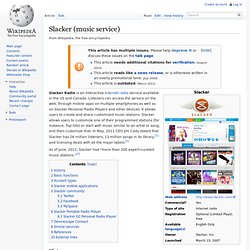
Listeners can access the service on the web, through mobile apps on multiple smartphones as well as on Slacker Personal Radio Players and other devices. It allows users to create and share customized music stations. Slacker allows users to customize one of their programmed stations (for instance, Top hits) or start with music similar to an artist or song, and then customize that. In May, 2011 CEO Jim Cady stated that Slacker has 26 million listeners, 13 million songs in its library,[1] and licensing deals with all the major labels.[2] As of June, 2012, Slacker had "more than 200 expert-curated music stations In September 2007, the service [8] finalized its deals with four major labels: Sony BMG Music Entertainment, EMI, Universal, and Warner; it also announced deals with thousands of Indie labels.[9]